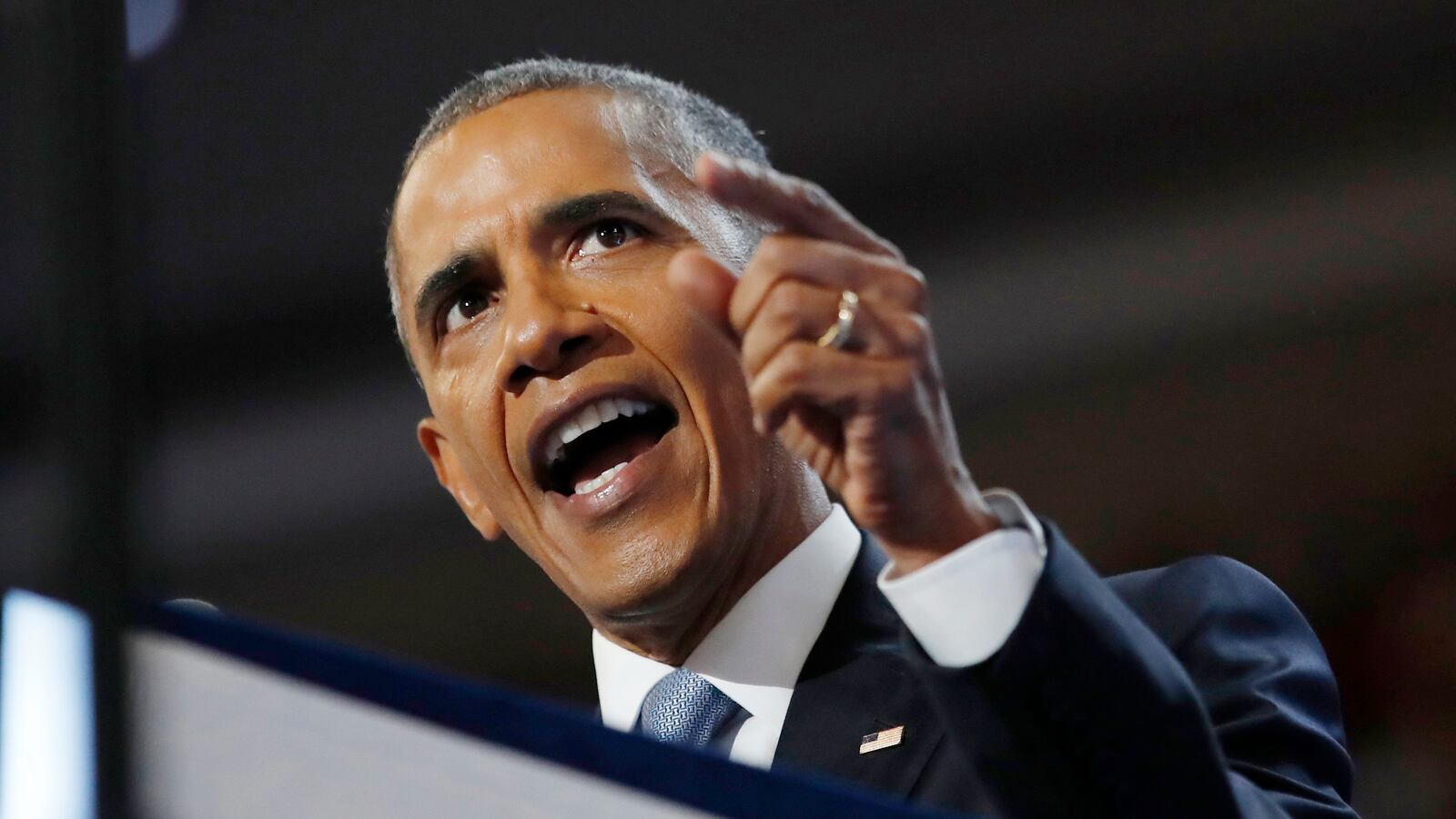PHILADELPHIA — A star-studded Broadway cast busted out a medley of What the World Needs Now Is Love to open up the prime time speeches of the Democratic National Convention here Wednesday evening.
It reflected the tone of this week’s goal. In one convention, the Democratic Party set out to co-opt traditionally Republican foreign policy views: of openness to the world, of American exceptionalism and of patriotic hopefulness.
“Ronald Reagan called America a shining city on a hill,” President Barack Obama said, referencing the conservative movement’s sainted figure. “Donald Trump calls it a divided crime scene that only he can fix.”
Speeches by Obama and others have been a dramatic departure from those given last week in Cleveland, with a wildly gesticulating Rudy Giuliani expounding about Benghazi, and Gov. Chris Christie conducting a mock trial convicting Hillary Clinton of foreign policy “crimes.”
And Obama struck a considerably different tone than that of Trump, who has spoken of moral equivalence between Russia and the United States, and said he doesn’t believe in American exceptionalism.
“What we heard in Cleveland last week wasn’t particularly Republican—and it sure wasn’t conservative,” Obama said.
In Philadelphia, no Democrats said Trump should be shot for treason, and no one called for him to be locked up. On national security and America’s role in the world, there was a mood one could not find in Cleveland: optimism. (Optimism bordering on naiveté, some said, but optimism nonetheless.)
On night three of the Democratic convention, there was less of an acknowledgement of recent tragedies and attacks around the world that Trump has attempted to capitalize on, and more of an emphasis on Trump’s statements that suggest to many that he is unfit to be the commander-in-chief.
In a wide-ranging speech that was praised as optimistic and forward-looking, Obama rebuked Trump based almost entirely on his rhetoric and proposals involving law and order and national security.
“And if you’re concerned about who’s going to keep you and your family safe in a dangerous world—well, the choice is even clearer,” Obama said, praising Clinton as the best person to confront various national security threats, namely the fight against ISIS.
“She’ll finish the job,” Obama continued. “And she’ll do it without resorting to torture, or banning entire religions from entering our country.”
Trump views those as winning issues for him in a world that has recently become a hotbed for terror attacks—particularly in the Middle East and Europe but also here in the U.S. Obama, on the other hand, views it as Trump’s biggest vulnerability and the most effective way to attack him.
“He cozies up to Putin, praises Saddam Hussein, and tells the NATO allies that stood by our side after 9/11 that they have to pay up if they want our protection,” the president said, referencing Trump’s recent comments raising doubts about whether he would defend America’s NATO allies.
Obama and Vice President Joe Biden directly addressed accusations that Trump is painting a dystopian picture of the country and peddling fear when it comes to security, safety and the threats of both homegrown and overseas attacks.
Biden, who seemed inspired and motivated after mentioning his late son early on in his speech, pushed back on Trump even more intensely than Obama, calling the GOP nominee “a man who embraces the tactics of our enemies, torture, religious intolerance,” and who “confuses bluster with strength.”
Tim Kaine, Clinton’s running mate, used his address at the convention to humanize the former secretary of state. The Virginia senator focused largely on domestic issues but touted his experience on the Senate Armed Services Committee.
His only mention of ISIS was part of a mocking of Trump’s rhetoric. “We are going to destroy ISIS so fast, believe me,” Kaine quipped.
The convention proceedings here have shown that Democrats are moving swiftly to the center on national security issues—usurping the space abandoned by a Republican Party dominated by Trump’s unconventional foreign policy views.
“Being engaged in the world in an ongoing basis means we decrease the likelihood of conflict,” said Laura Rosenberger, a foreign policy adviser to the Hillary Clinton campaign, at a Thursday morning event hosted by the U.S. Global Leadership Coalition.
Added Madeleine Albright, a former secretary of state who served in Bill Clinton’s administration: “Nothing works when the United States is not involved.”
These were the kind of statements that just months ago might be dismissed as vapid and empty. They reflected the broadest strokes of the American bipartisan foreign policy consensus.
But not anymore. That consensus has been shattered by a Republican nominee who has said he wants to pull back from the country’s commitment to NATO, nix trade deals and build a wall on the southern border—and recently encouraged Russia to hack and release Hillary Clinton’s emails.
As Clinton gears up to accept her party’s nomination here Thursday night, Democratic Party leaders who have addressed the convention so far hope that their prose has set the tone for the former secretary of state to offer stark contrast with her opponent.






